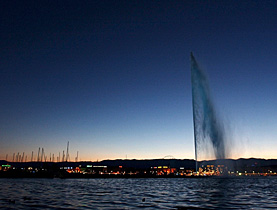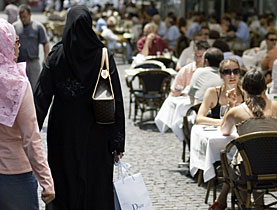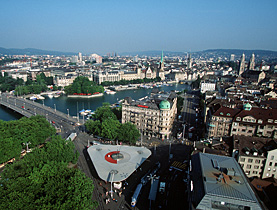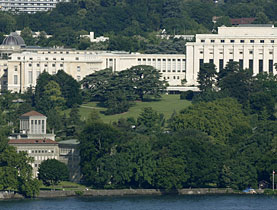Sociologists ponder Geneva’s existence

The open, cosmopolitan city of Geneva, host to many international organisations and firms, has an identity problem, claim Swiss sociologists.
In a study by Geneva University, 92.7 per cent of the population say they love living in the city, but the vast majority are not interested in investing in its politics, public works or cultural scene.
The survey was one of a range of topics being discussed at a three-day Identities and Lifestyle Changes conference that opened on Monday at Geneva University, organised by the Swiss Sociology Society.
“The Geneva population likes to live in Geneva. It’s a nice city with good living conditions, but they do nothing to invest in it,” Sandro Cattacin, a sociology professor at Geneva University, told swissinfo.ch.
“The city is a centre with high-level services, but without an identity.”
Cattacin and his team have carried out a poll of 425 local residents looking at the question, “Does Geneva really exist?”
Among the answers to the survey, only 30 per cent said they knew where Protestant Reformer John Calvin was born, one in five knew how many politicians made up the local government and only two per cent knew the name of the cantonal president.
People live in Geneva, but they don’t know the city – and its reputation for openness can be problematic, Cattacin said.
“It’s very easy to enter Geneva; you are immediately a Geneva citizen when you arrive, as no one asks you anything,” he said. “But this openness creates a sort of distance between people.”
“No soul”
The survey also underlined how difficult it is to encounter new people in Geneva and create social ties, with 50 per cent of respondents claiming the city is “cold”.
“Without an urban centre or places for the locals to meet up or celebrate, Geneva has no soul or heart beating for a common destiny,” Cattacin wrote.
Only 29.1 per cent of the local population were found to be involved in any kind of voluntary work – much lower than in Basel (38.2 per cent) and Zurich (40.4 per cent), and below the 40.8 per cent Swiss average.
Political activism in Geneva is also low-key. Only 42.2 per cent of those questioned said they were interested in politics: mainly older, professional men. Geneva had a voter turnout rate of 37 per cent in 1999, one of the lowest in Switzerland.
Although there are some 300 local associations, they are instrumentalised by the state and the city is made up of many closed communities which don’t interact, Cattacin said.
“The Geneva elite are completely isolated in the places they live and work. If you go to [the wealthy district of] Cologny, you will not see neighbours discussing. At the [working-class district of] Jonction you will see people chatting, but you always see the same communities together: blacks with blacks, Arabs with Arabs, and students with students. We are all in the same city, but we don’t know anything about the others,” he explained.
Only Swiss metropolis
Carine Bachmann, in charge of territorial organisation and foreign relations for the city of Geneva, said she was struck by the contrast between people’s love of the city and their lack of personal investment.
“But Geneva has always been a chaotic place where people are passing through, made up of parallel worlds which are full of contradictions and difficult to manage,” she said. “Maybe Geneva is Switzerland’s only metropolis.”
Some 50,000 people move to or away from Geneva every year. And every day there are 500,000 recorded movements of people travelling back and forwards between Geneva and neighbouring France and canton Vaud.
“I always feel a stranger here and that’s something I appreciate,” she added.
“Parallel discourse”
The city’s identity problem is not helped by a “parallel discourse” between its tourist image sold abroad – the Lake Geneva Jet d’Eau fountain, the Reformers’ Wall, banks, luxury shops and International Geneva – and the local reality, say the researchers.
The most important aspects of the city for residents were their neighbourhoods (34 per cent), the lake (19 per cent) and private homes (18 per cent), according to the poll.
To try to resolve this dichotomy, Geneva has to develop “urban marketing” for locals, like in Basel, which seems to have better understood the problem, Cattacin said.
“Basel has invested in marketing the city and local initiatives; it creates a space where you feel well and invest in the city as you feel it’s your city. You don’t put garbage on the floor, which is normal in Geneva, and you respect things like public transport,” he said.
“If you want an innovative, creative city in the future, you need people to think that it’s important to invest in the city and give to it and not just use it.”
Simon Bradley in Geneva, swissinfo.ch
French-speaking Geneva is at the western end of Lake Geneva, surrounded on almost all sides by France. The canton has 103 kilometres of borders with Switzerland’s neighbour and just 4.5 kilometres with the rest of the country.
The city itself has 185,000 inhabitants, while the canton has 453,439 (2008). The metropolitan Geneva area (which includes nine other towns) covers most of the canton and spreads across into France (population 730,000).
Some 40 per cent of the Geneva population is foreign. Some 50,000 people move to or away from Geneva every year.
Geneva is home to the headquarters of 22 international organisations, such as the World Health Organization, the World Trade Organization and International Committee of the Red Cross.
“International Geneva”, as it is known, is worth around SFr5 billion ($4 billion) a year to the canton.
In all some 40,000 international diplomats and civil servants are based in Geneva; in addition there are around 2,400 staff working for non-governmental organisations. Around 8,500 staff work for the United Nations family in Geneva, which is the largest concentration of UN personnel in the world.
Geneva is regularly ranked in the top ten of quality-of-living listings by firms like Mercer.

In compliance with the JTI standards
More: SWI swissinfo.ch certified by the Journalism Trust Initiative




You can find an overview of ongoing debates with our journalists here. Please join us!
If you want to start a conversation about a topic raised in this article or want to report factual errors, email us at english@swissinfo.ch.